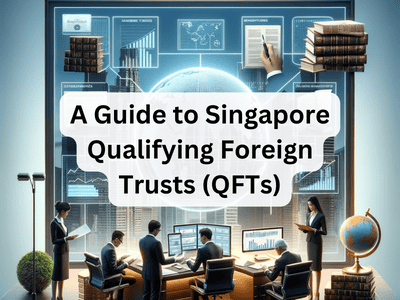What’s the Singapore Qualifying Foreign Trusts (QFTs) All About?
 Singapore has firmly established itself as one of the world’s leading wealth management hubs. High-net-worth individuals (HNWIs), family offices, and international investors are increasingly choosing Singapore as a jurisdiction for setting up trusts to protect and grow their wealth.
Singapore has firmly established itself as one of the world’s leading wealth management hubs. High-net-worth individuals (HNWIs), family offices, and international investors are increasingly choosing Singapore as a jurisdiction for setting up trusts to protect and grow their wealth.
One of the most attractive options is the Singapore Qualifying Foreign Trust (QFT), which provides significant tax incentives for foreign investors looking to establish trusts in the country. This initiative, backed by the Monetary Authority of Singapore (MAS), enhances Singapore’s appeal as a global trust and wealth management hub.
There are many advantages to setting up a trust in Singapore. The process is straightforward, with minimal bureaucratic hurdles. Additionally, managing a trust here is relatively simple, even for individuals considering a change in citizenship or domicile, or those with family members residing abroad. The streamlined estate planning framework allows for seamless asset transitions without prolonged legal procedures.
What makes it even more compelling? Foreigners can establish a trust in Singapore through the QFT framework. With the proper Singapore incorporation and trust administration services, this process becomes even more accessible, allowing investors to optimize their wealth management strategies while benefiting from Singapore’s pro-business environment.
A High Networth Individuals’ First Choice
The socio-economic conditions of Singapore offer an ideal environment for High Networth Individuals (HWIs) to set up trusts. Here are some reasons why HWIs love Singapore for setting up their trust accounts:
- Political stability and supportive government
- A robust legal system
- Competitive tax regime
- Progressive financial regulatory framework
- Well-respected wealth management and trust jurisdiction
Qualifying Foreign Trusts in Singapore
Singapore trusts abide by the English trust law principles. Therefore, anyone who sets up a trust in Singapore will predominantly have their trust regulated by the Trustees Act. The act is regularly updated to keep up with the ever-changing needs of the trust sector. With such regulations in place, trustees are expected to abide by certain minimum standards. This comes into effect when a trustee wishes to exercise their powers.
The Trust Act acts as a framework that clearly identifies a trustee’s duty of care. Do trusts get taxed? Yes, but it will depend on the residency of the faith in question. For example, trusts with Singapore residency and no exemption will have their income taxed. The tax will be either at the trustee level or the beneficiaries.
In the case of Singapore QFTs, they may be exempted from getting taxed in Singapore for certain “specified income”. Examples of this type of income include rents, premiums, and royalties from external sources (outside Singapore). It also includes interests and dividends from external investments (outside Singapore). Any gains, profits, and distribution from investments and trusts outside of Singapore also count.
All of the above only applies if the beneficiary or the settlor of the trust is not a Singapore resident, citizen, or Singapore company. In this case, the trust should be administered by a licensed Singapore trust company.
Other Tax Exemptions
Tax exemptions also apply where beneficiaries qualify as an “eligible holding company”. This means the company has been incorporated outside Singapore and is wholly owned by the trustee. The company should also have been formed for the specific purpose of holding QFT assets.
Why Investors Choose QFTs in Singapore
QFTs in Singapore are desirable because of the level of confidentiality that comes with it. QFT holders don’t need to reveal the identities of the beneficiaries or settlers, and they have no registration requirement. Private trust companies are also available for investors who want them.
Per Singapore law, all trusts are valid for 100 years unless a shorter period has been specified in the deed. QFTs keep going even when the settlor or beneficiary becomes a Singapore resident or citizen (subject to certain conditions).
With an extensive double tax treaty network with more than 70 countries globally, Singapore QFTs are gaining substantial interests. The 2005 Trust Companies Act (TCA) oversees the governance of the trust business in Singapore. Strict confidentiality provisions are enforced by the Monetary Authority of Singapore (MAS) and the TCA.
Families prefer private trust companies because the company acts as the trustee. Thus, this ensures that families have greater control over their assets. Greater privacy is available, too, where such trusts are concerned. With the support of Singapore incorporation services, the trust structure’s validity is neither compromised nor its residency (tax purposes). That is why private trust companies have the advantage of long-term and immediate tax planning.
Although private trust companies are exempted from licensing by MAS, a licensed trust company must be appointed. The company will administer MAS’ anti-money laundering obligations. With its business-friendly and progressive approach, Singapore remains the top choice for the wealthy who want to set up a trust for their families.



